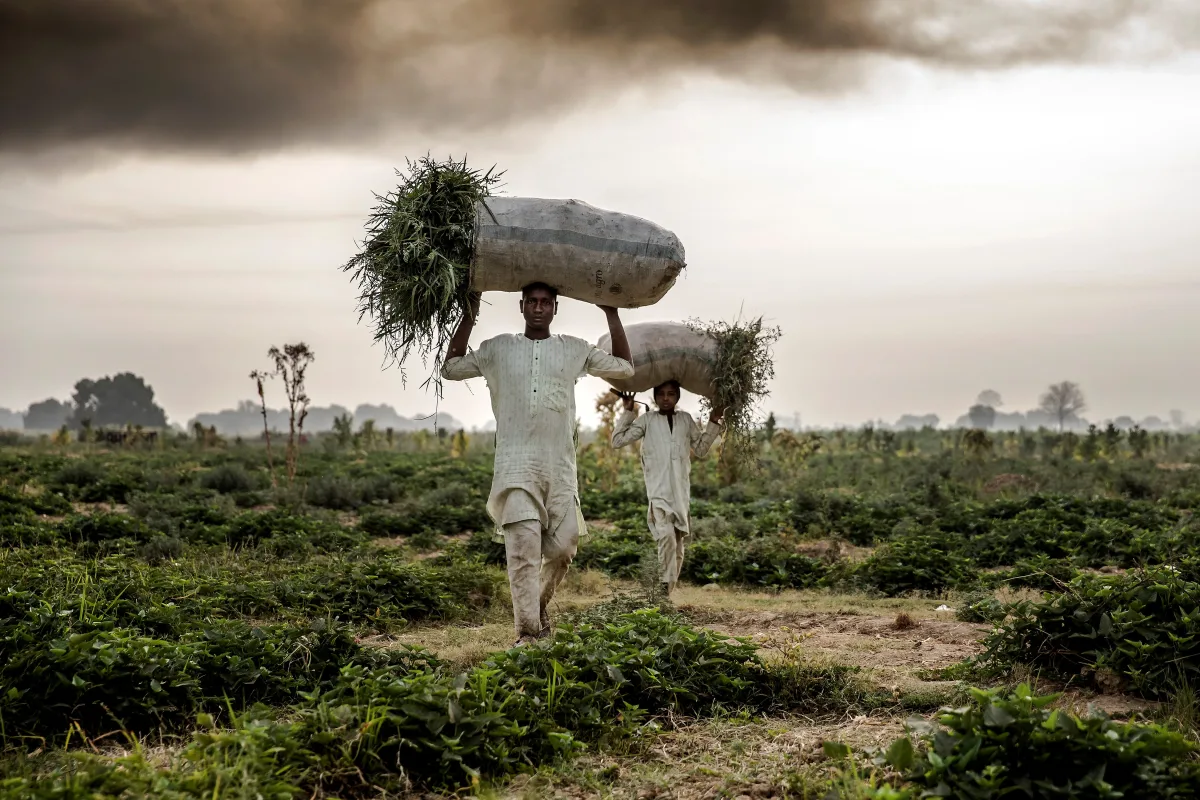When Michael Taiwo Akinkunmi, then a 24-year-old civil servant, decided to enter a competition to design a national flag in the run-up to Nigeria’s independence in 1960, he had no doubt about which colour to emphasise. Green should dominate this symbol of the nation, he believed, to reflect the importance of agriculture to the country.
Agriculture remains at the centre of Nigeria’s national identity – but the country can hardly be said to have made farming a priority in the years after independence. Instead, it was oil that came to dominate the economy at the expense of all other sectors. Successive governments have paid little more than lip service to developing agriculture over the past six decades.
This has led to a situation in which Nigeria, which boasts climatic conditions that are well-suited to growing a wide variety of crops, is dependent on food imports. The total value of agricultural imports was more than three times higher than exports between 2018 and 2022, according to official trade data. Some staples, notably wheat, are almost entirely imported; even crops that can easily be grown in Nigeria, including rice, are often bought from overseas.
Nevertheless, some green shoots appear to be emerging, with attitudes towards agriculture slowly changing and technology poised to play a greater role in the sector. The new government of President Bola Tinubu has promised to make agriculture a priority; if it can succeed in raising production, Nigeria’s economy will take a huge leap towards recovery.
“A lot of work to do”
Reuven Cohen, originally from Israel, arrived in Nigeria in the early 1980s after being offered a job as a farm manager. “Nigeria is a very, very blessed country,” he says, noting that varying climatic conditions across different parts of the country allow for a huge range of food types to be produced.
Cohen, who now owns an agricultural services company called Afri Fruits, tells African Business that he was the first to introduce various innovations to Nigerian agriculture, including drip irrigation, greenhouses and hydroponic systems for producing lettuce. But his four decades in the farming sector have been far from easy.
“You have to be on your own,” he says. “You don’t have any help from government.” While food production is heavily subsidised by governments in many parts of the world, Cohen says that farmers can expect little financial support from the government in Nigeria. Worse still, the government has neglected to put an enabling environment in place. Vital infrastructure for food processing and cold storage is largely absent.
On top of this, Cohen complains that agriculture is often not taken seriously as a business venture in Nigeria, noting that banks are typically reluctant to offer credit to farmers that want to expand their operations.
A new government taking office does raise hope that the country can finally get closer to fulfilling its potential in agriculture – but few would disagree with agricultural expert Chijioke Ndem, who cautions that the government has “a lot of work to do”. He echoes Cohen in stressing that poor logistics infrastructure is a “big impediment” for farmers, while agreeing that finding ways to improve mechanisation must be a key priority.
Ndem notes that incoming administrations typically produce “beautiful policies” that often prove challenging to implement. But an “encouraging” sign is that Tinubu immediately added ‘food security’ to the title of the Federal Ministry of Agriculture & Food Security. The name change, says Ndem, is an acknowledgement of how the sector is critical to the country’s wellbeing.
Food insecurity
The renamed ministry has its work cut out to mitigate major food shortages in the coming months. USAID’s Famine Early Warning Systems Network warns that large parts of Northern Nigeria face ‘crisis’ levels of food insecurity. Pockets of the north-east are facing an ‘emergency’ situation.
This reflects how food prices shot up in the wake of Russia’s invasion of Ukraine in 2022, which disrupted Nigeria’s access to grain imports. This surge in prices has been further worsened by the depreciation of the naira since mid-2023, which has led to all imported goods becoming more expensive.
The grave situation underlines the importance of Nigeria ramping up its domestic food production. In tackling this challenge, says Umar Mohammed from the non-profit Africa Enterprise Challenge Fund (AECF), joined-up thinking is needed. “There hasn’t been a dearth of initiatives,” he says, referring to various schemes to boost mechanisation and improve access to inputs, “but it needs to have a holistic approach in order for it to actually work better.”
A key issue, he adds, is to enhance the contribution of women-owned agricultural businesses. Mohammed is the programme manager of AECF’s Investing in Women in Nigeria scheme, through which female farmers can apply for matching fund grants if they meet certain criteria. Empowering women in agriculture, he says, has multiple benefits throughout society. “When women expend their income, it’s usually towards supporting family activities,” he says.
The rise of tech
While the challenges facing the sector may appear almost overwhelming, Ndem does see positive signs through the growing use of technology. “The ICT boom is also a good thing for the agriculture space in Nigeria,” he says, noting that the improved ability to communicate with farmers at the “last mile” can allow for data and knowledge to be transferred much more easily – with significant benefits for productivity.
One company seeking to accelerate the use of technology is agtech firm Thrive Agric. “We’re starting from the smallholder farmers,” says Oshone Anavhe, the firm’s vice president of operations. “We want to essentially empower them with economies of scale,” he explains, noting this can cover input financing, extension services, access to markets and even financial literacy.
Anavhe says that Thrive Agric works with around 600,000 farmers in total. One of the ways it is using technology is in “data driven decisions”. Farmers use the company’s app, which works in offline mode, to input data. They then receive advice, for example on the optimum time to plant crops based on the conditions they report in their fields.
Thrive Agric’s use of technology goes far beyond providing advice. The company’s ambitions involve reshaping entire agriculture value chains. It provides ‘financing in kind’, by supplying farmers with inputs such as seeds and fertilisers and delivers guidance to help farmers optimise production. At harvest season, the farmers repay Thrive Agric in kind by selling their crops to the company, which then delivers the produce to food processors or other bulk buyers.
In other words, Thrive Agric operates at a scale that sees farmers bypassing the middlemen to whom they would traditionally sell.
Whether this kind of business model ultimately proves successful remains to be seen. What is clear is that technology will play an ever-greater role in agriculture. Speeding-up the deployment of technologies that help to farmers to increase production and make better use of their resources will be vital if Nigeria’s agricultural sector is to finally fulfil its potential and feed the country’s more than 200 million people.
Want to continue reading? Subscribe today.
You've read all your free articles for this month! Subscribe now to enjoy full access to our content.
Digital Monthly
£8.00 / month
Receive full unlimited access to our articles, opinions, podcasts and more.
Digital Yearly
£70.00 / year
Our best value offer - save £26 and gain access to all of our digital content for an entire year!
 Sign in with Google
Sign in with Google 



